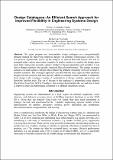3.1.2 Design Catalogues: An Efficient Search Approach for Improved Flexibility in Engineering Systems Design
Author(s)
Cardin, Michel-Alexandre; de Neufville, Richard
DownloadDe Neufville_Design Catalogs.pdf (626.8Kb)
OPEN_ACCESS_POLICY
Open Access Policy
Creative Commons Attribution-Noncommercial-Share Alike
Terms of use
Metadata
Show full item recordAbstract
This paper proposes and demonstrates design catalogues as a computationally efficient method for identifying improved designs for complex technological systems. This new process significantly speeds up the analysis of systems that will operate and will be managed under various uncertainty scenarios. It enables analysts to explore the design space more fully, taking into account a greater number of design parameters and variables. It can lead to design solutions with greatly improved lifecycle performance. The design catalogue consists of a small subset of designs that collectively perform reasonably well over a range of possible scenarios. The catalogue approach contrasts with the usual approach that optimizes designs for each scenario, and thus can only afford to examine a limited number of situations. Each design in the catalogue consists of combinations of design variables, parameters, and flexibility decision rules. The set of designs in the catalogue is determined using adaptive One-Factor-At-a-Time (aOFAT) analysis. An example demonstrates the use and how it leads to improved lifecycle performance compared to a standard benchmark design.
Date issued
2014-11Department
Massachusetts Institute of Technology. Engineering Systems DivisionJournal
INCOSE International Symposium
Publisher
Wiley Blackwell
Citation
Cardin, Michel-Alexandre, and Richard de Neufville. “3.1.2 Design Catalogues: An Efficient Search Approach for Improved Flexibility in Engineering Systems Design.” INCOSE International Symposium 23, no. 1 (June 2013): 62–83.
Version: Author's final manuscript
ISSN
23345837